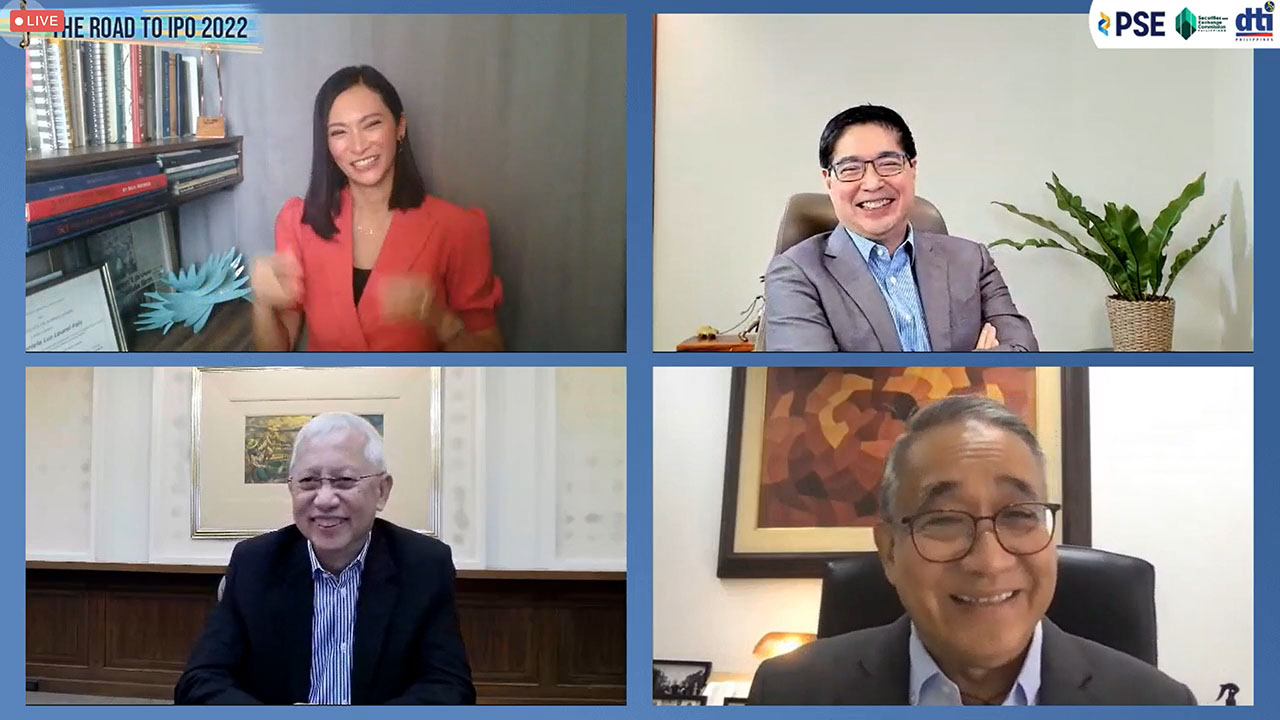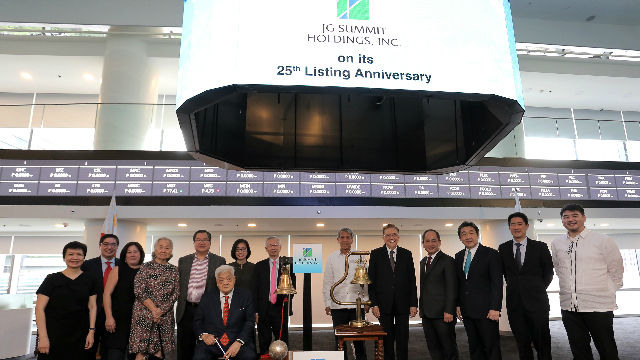JG Summit President and CEO Lance Y. Gokongwei recently took part in the “Road to IPO 2022”, an event organized by the Philippine Stock Exchange in partnership with the Securities and Exchange Commission and the Department of Trade and Industry.
 In the talk moderated by Daniela Laurel, JG Summit President and CEO Lance Y. Gokongwei was joined by Herbert M. Consunji, founding director and CFO of DMCI Holdings (bottom left) and Francisco C. Sebastian, chairman of GT Capital Holdings.
In the talk moderated by Daniela Laurel, JG Summit President and CEO Lance Y. Gokongwei was joined by Herbert M. Consunji, founding director and CFO of DMCI Holdings (bottom left) and Francisco C. Sebastian, chairman of GT Capital Holdings.
The online forum, held on September 15, 2022, was part of the PSE’s ongoing campaign to encourage more companies to list their shares on the local bourse. “It should also help us keep pace with our regional peers in terms of generating a number of IPOs. For this event, we hope to be able to show the financial and strategic benefits of going public,” said Ramon S. Monzon, PSE president and CEO, in the opening remarks.
The multiple advantages of being a publicly traded company were brought to light in the session entitled “IPO as a Key Strategic Initiative.” Apart from JG Summit’s president and CEO, DMCI Holdings Founding Director, Chief Finance Officer, and Executive Vice-President Herbert M. Consunji and GT Capital Holdings Chairman Francisco C. Sebastian also participated in the virtual fireside chat moderated by Daniela Laurel.
Asked about the catalyst behind JG Summit Holdings’ transformation from a privately held, family-run business to publicly listed conglomerate, Gokongwei said that it arose from the vision of the company’s founder, John Gokongwei Jr. “His philosophy was that he wanted to build a company that endured. And the family culture has always been that the family is here to serve the business, and not the other way around.”
The first of the Gokongwei Group’s companies to list on the local stock exchange was Robinsons Land Corporation, which joined the PSE in 1989; its parent holding company, JG Summit Holdings, Inc., was listed a few years later, in 1993.

According to Gokongwei, Mr. John and his brothers believed that going the IPO route would serve more than one important purpose. The first was that it would raise the long-term capital required for JG Summit to enter into more capital-intensive businesses to support the nation’s economic growth. “At that time, in the mid-90s, President Ramos liberalized a lot of the economy and long-term capital began to become available in the Philippines. That's when we entered several industries, including petrochemicals, airlines, and telecoms.”
The second effect of the IPO was to fulfill Mr. John’s vision of having a company that stood the test of time. “He wanted [JG Summit] to become a public company in order to have the scrutiny and the governance associated with public companies. When you have to report your earnings, your results, and explain to shareholders every quarter, it puts in a certain discipline in the way you run your business. That kind of scrutiny is good for the business, especially if we look in longer timeframes,” shared Gokongwei.
JG Summit’s share listing also provided another key to the company’s long-term sustainability. Becoming a public company “removes a lot of the reasons why many families fight in the second or third generations,” said Gokongwei. “If you create that listing mechanism, family members who may not be as interested in the business may have an opportunity to sell out or to collect dividends.”
Gokongwei later touched on the significance of listing the holding company (JG Summit) as well as several of its subsidiaries (Universal Robina Corporation, Cebu Pacific, Robinsons Land, and RL Commercial REIT (RCR), among others).
According to Gokongwei, it was important to determine from the start the role of the holding company. “For us, its main job is to allocate limited resources and that's what we consider capital and talent to determine strategy, build centers of excellence, and create synergies and ecosystems among our businesses. We believe, though, that the holding company should have a light touch on their operating subsidiaries. Once they reach a certain level of maturity, they should have the independence of balance sheet and boards to pursue their own destiny.”
When these subsidiaries reach a certain level of maturity, the goal is to have their own independent listings. Gokongwei offered that the holding company is primarily a “capital allocation device” where investors or shareholders can benefit from “the entrepreneurial spirit of the management and the ecosystems for new businesses that we may develop, but shareholders who prefer more focused plays either in consumer goods, property, or the airline business can make investments in those specific companies.”
As the discussion circled back to the high levels of scrutiny that public companies face, Gokongwei was asked if JG Summit’s IPO affected the business vision of his father, a man who was known as an “industrialist challenger” for daring to disrupt highly competitive industries or venture into uncharted territory.
Gokongwei shaped his response by referring to the company’s purpose of having an “unrelenting commitment to provide our customers with better choices, creating shared success with our stakeholders,” which itself is highly reflective of Mr. John’s innovative and entrepreneurial spirit. “It talks about meaningful breakthroughs. To have meaningful breakthroughs, it's important to have innovative ideas. It's important to have a founder's mentality, but it's also important to have capital and long-term capital to pursue those objectives. The capital markets, especially the stock market, do provide one avenue to raise that long-term capital to pursue those projects that can really be impactful to Filipinos.”
By prudently tapping into the market 30 years ago, JG Summit was able to make Filipino lives better by providing more affordable airfare with Cebu Pacific, by introducing them to unlimited calls and text through Sun Cellular, and by building the country’s only petrochemical complex with JG Summit Olefins Corporation, among others. These transformative businesses were enabled by the long-term capital provided by the capital markets and “having a founder with courage and love for country,” said Gokongwei.

To conclude the session, Gokongwei voiced his thoughts on the PSE’s advocacy of encouraging Filipinos to participate in developing the country’s economy by becoming retail investors or shareholders in listed companies. “We do need investment in this country. I do believe that if retail investors own pieces of successful businesses, it creates an owner's mentality or entrepreneurial mentality among our countrymen, that they have a stake in the economic success of different companies and of the whole country. So I think once we instill this mentality that we are all shareholders, we all benefit from this rising tide; it can only benefit the entire country and the entire economy.”


